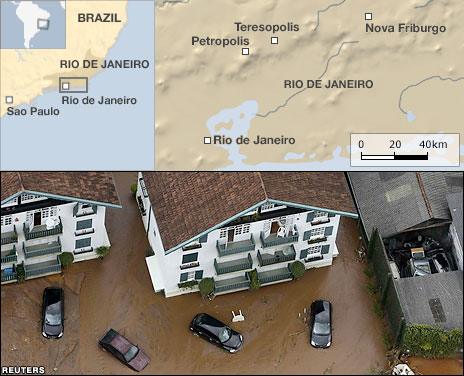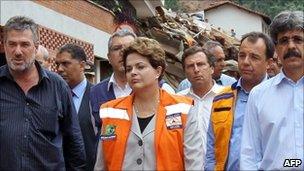Brazil flood and mudslide deaths rise as rescue goes on
- Published
A woman in Brazil narrowly avoids being swept away
More than 420 people have now been killed by flooding and mudslides in south-eastern Brazil, officials say.
About 200 people have died in the town of Nova Friburgo, some 175 in Teresopolis and dozens more in Petropolis, media report. Thousands of people have been made homeless.
Rio de Janeiro Governor Sergio Cabral blamed local governments for allowing poor building and illegal occupations.
President Dilma Rousseff has toured damaged areas in Nova Friburgo.
She vowed that there would be "firm action" by the government.
Ms Rousseff was accompanied by Mr Cabral and other politicians and later left for a press conference in Rio, where she spoke of the "dramatic" scenes she had seen.
Expressing solidarity with the victims, she said: "The suffering of the people is very great."
'It was hell'
Heavy rain fell early on Thursday as rescuers resumed their search but lightened during the day.
The collapse of electricity and communications systems, combined with the destruction of many roads and bridges, has severely hampered the rescue work.
More than 800 rescuers are conducting searches and the Brazilian navy is sending a field hospital to the area.
Morgues in the affected towns were full, with churches and police stations receiving bodies.
Officials in Brazil's civil defence department have warned there could be hundreds more bodies yet to be recovered in Teresopolis alone, the Globo media organisation reported.
One area of Teresopolis, Campo Grande, remains cut off entirely and is yet to be reached by any rescuers. It is feared 150 people may be buried there.
The mayor of Teresopolis, Jorge Mario, said: "It's like an earthquake struck some areas. There are three or four neighbourhoods that were totally destroyed. There are hardly any houses standing there and all the roads and bridges are destroyed."

He has declared a state of emergency in the town.
One resident of Teresopolis, Angela Marina de Carvalho Silva, told the Associated Press news agency she feared she might have lost 15 relatives, including five nieces and nephews.
"There are so many disappeared - and so many that will probably never be found," she said.
She said she had taken refuge at a neighbour's house on higher ground and watched the water sweep away cars, tree branches and animals and destroy the homes of friends and family.
"There was nothing we could do. It was hell."
Amid the death and destruction in Nova Friburgo there was one glimmer of hope: a six-month-old baby, reportedly named Nicholas, was found alive after 12 hours trapped in the rubble of a ruined building, reports said.
In Petropolis, Mayor Paul Mustrangi said the waters had ripped through some areas with devastating effect.

The visiting Ms Rousseff vowed "firm action" from the government
"There is nothing left. All the houses were hit," he told Jornal do Brasil.
On Wednesday President Rousseff signed a decree authorising 780m reais ($480m; £296m) in emergency funding for the affected areas.
Governor Cabral said local governments in Nova Friburgo, Teresopolis and Petropolis had failed to assert proper control over construction for decades, with the towns quadrupling their populations.
He said that unless such illegal structures were tackled, similar disasters could happen.
Speaking later at the same conference as the president, Mr Cabral warned that the weather forecast was not good and more landsides could occur.
'Sea of mud'
Civil defence officials in Teresopolis said that the town was soaked with 144mm of rain in 24 hours - more than the usual amount for the whole of January.
There is no drinking water in the three badly affected towns, officials say, and there is concern about water-borne diseases.
Witnesses said rescue teams were using heavy machinery, shovels and their bare hands to dig through tonnes of mud and debris.
One resident described the situation just outside Petropolis as a "sea of mud".
"I've lived here 25 years and never seen anything like it," Manoel Candido da Rocha Sobrinho told Folha website.
"I live in a higher spot but when I look down I just see a sea of mud. Most people saved themselves by scrambling up trees or fleeing to higher ground."
Earlier this week, torrential rains in neighbouring Sao Paulo state left 13 people dead and brought traffic chaos to Brazil's biggest city.
- Published13 January 2011